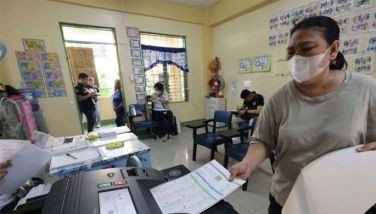Informatics introduces ‘Ethical Hacking’ courses
February 19, 2007 | 12:00am
Informatics is going full swing with the recent re-launch of its Certified Ethical Hacking course and the launch of Computer Hacking Forensic Investigation course.
Informatics president Leo Riingen shared the success story of Informatics, the institution determined to fight the growing threat of cyber-crime all over the world, during the launch.
Chikka Asia CEO Chito Bustamante delivered an update of the "Current State of Ethical Hacking" and "Information Technology Security," while the guest of honor, Desmond Ng, counsellor of the Singaporean Embassy, extended his congratulatory note to Informatics for its success in bringing cyber security to the country.
A certified ethical hacker primarily evaluates the security of a computer system or network by simulating an attack by a malicious hacker. The process involves an active analysis of the system for weaknesses, technical flaws or vulnerabilities.
Computer Hacking Forensic Investigation refers to the process of detecting hacking attacks and properly extracting evidence to report the crime and conduct audits to prevent future attacks.
Computer forensics is simply the application of computer investigation and analysis techniques in the interests of determining potential legal evidence.
The Informatics Ethical Hacking and Computer Hacking Forensic Investigation courses will equip graduates with detailed knowledge of the nature of attacks and methods used by computer criminals.
They will also be trained to design counter-measures against criminal intrusion, penetration and hacking while continuously updating and developing their knowledge and skills.
Currently, there is a huge demand for certified computer hackers worldwide since nearly all companies are equipped with networks that have to be regularly tested.
Informatics is an international conglomerate established in 1983. The Singapore-based educational institution has more than 500 centers in 44 countries worldwide.
In the Philippines, Informatics has campuses in Northgate Cyberzone in Alabang, Muntinlupa; Cainta, Rizal; Eastwood and North EDSA in Quezon City, and the University Belt in Manila, as well as training centers nationwide.
Informatics is accredited by the Commission on Higher Education and the Technical Education and Skills Development Authority.
Informatics president Leo Riingen shared the success story of Informatics, the institution determined to fight the growing threat of cyber-crime all over the world, during the launch.
Chikka Asia CEO Chito Bustamante delivered an update of the "Current State of Ethical Hacking" and "Information Technology Security," while the guest of honor, Desmond Ng, counsellor of the Singaporean Embassy, extended his congratulatory note to Informatics for its success in bringing cyber security to the country.
A certified ethical hacker primarily evaluates the security of a computer system or network by simulating an attack by a malicious hacker. The process involves an active analysis of the system for weaknesses, technical flaws or vulnerabilities.
Computer Hacking Forensic Investigation refers to the process of detecting hacking attacks and properly extracting evidence to report the crime and conduct audits to prevent future attacks.
Computer forensics is simply the application of computer investigation and analysis techniques in the interests of determining potential legal evidence.
The Informatics Ethical Hacking and Computer Hacking Forensic Investigation courses will equip graduates with detailed knowledge of the nature of attacks and methods used by computer criminals.
They will also be trained to design counter-measures against criminal intrusion, penetration and hacking while continuously updating and developing their knowledge and skills.
Currently, there is a huge demand for certified computer hackers worldwide since nearly all companies are equipped with networks that have to be regularly tested.
Informatics is an international conglomerate established in 1983. The Singapore-based educational institution has more than 500 centers in 44 countries worldwide.
In the Philippines, Informatics has campuses in Northgate Cyberzone in Alabang, Muntinlupa; Cainta, Rizal; Eastwood and North EDSA in Quezon City, and the University Belt in Manila, as well as training centers nationwide.
Informatics is accredited by the Commission on Higher Education and the Technical Education and Skills Development Authority.
BrandSpace Articles
<
>
- Latest
Latest
Latest
January 19, 2025 - 12:39pm
By Alex Pigman | January 19, 2025 - 12:39pm
January 6, 2025 - 11:05pm
January 6, 2025 - 11:05pm
December 1, 2024 - 3:59pm
December 1, 2024 - 3:59pm
November 18, 2024 - 12:00am
November 18, 2024 - 12:00am
Recommended

























